人教版高中英语 必修2 Unit 3Computers-知识点复习学案
高中英语人教版必修2-unit3-computers单元综合复习
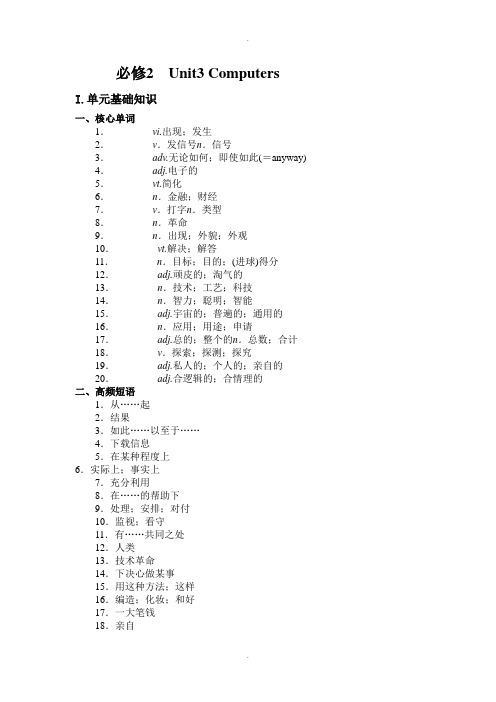
必修2 Unit3 ComputersI.单元基础知识一、核心单词1.________ vi.出现;发生2.________ v.发信号n.信号3.________ adv.无论如何;即使如此(=anyway) 4.________ adj.电子的5.________ vt.简化6.________ n.金融;财经7.________ v.打字n.类型8.________ n.革命9.________ n.出现;外貌;外观10.________ vt.解决;解答11.________ n.目标;目的;(进球)得分12.________ adj.顽皮的;淘气的13.________ n.技术;工艺;科技14.________ n.智力;聪明;智能15.________ adj.宇宙的;普遍的;通用的16.________ n.应用;用途;申请17.________ adj.总的;整个的n.总数;合计18.________ v.探索;探测;探究19.________ adj.私人的;个人的;亲自的20.________ adj.合逻辑的;合情理的二、高频短语1.从……起________2.结果________3.如此……以至于……________4.下载信息________5.在某种程度上________6.实际上;事实上________7.充分利用________8.在……的帮助下________9.处理;安排;对付________10.监视;看守________11.有……共同之处________12.人类________13.技术革命________14.下决心做某事________15.用这种方法;这样________16.编造;化妆;和好________17.一大笔钱________18.亲自________19.总共;一共________20.随着……的出现/兴起________三、重点句型〔填空〕1.I developed very ________(slow) and it took nearly two hundred years ________ I was built as an analytical machine by Charles Babbage.我发展得很慢,差不多两百年之后,查尔斯·巴比奇才把我制成了一台分析机。
人教版高中英语必修2《Unit3Computers》教案
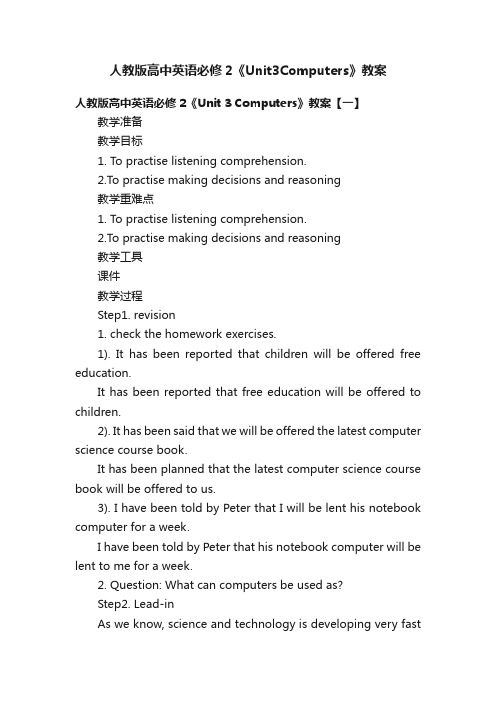
人教版高中英语必修2《Unit3Computers》教案人教版高中英语必修2《Unit 3 Computers》教案【一】教学准备教学目标1. To practise listening comprehension.2.To practise making decisions and reasoning教学重难点1. To practise listening comprehension.2.To practise making decisions and reasoning教学工具课件教学过程Step1. revision1. check the homework exercises.1). It has been reported that children will be offered free education.It has been reported that free education will be offered to children.2). It has been said that we will be offered the latest computer science course book.It has been planned that the latest computer science course book will be offered to us.3). I have been told by Peter that I will be lent his notebook computer for a week.I have been told by Peter that his notebook computer will be lent to me for a week.2. Question: What can computers be used as?Step2. Lead-inAs we know, science and technology is developing very fastand computers have become smaller and smaller. They have been used in many fields. So, the 21st century is the century of information technology What does it mean? Does information technology/ IT only mean things like computers? Of cause not. Actually, it means more than computers. Computers are just one kind of IT. What else do you know is part of IT?(TV, radio, CD-ROM, DVD, books……)Step3. Listening (SB)1. Pre-listening: What are the changes brought by different forms of IT ?What are the advantages and disadvantages of them ?2. While-listening:Go through the chart and make sure the students look at the chart before they listen to the tape. (This is to sharpen their attention and listen for the answers. This will also help them get the gist of the text.) Then Listen to the tape and finish filling in the chart. (If necessary, play the tape for several times.) Say: After listening to their talk, we know all kinds of IT have both disadvantages and advantages.Let’s check the answers together.Type of IT Advantages DisadvantagesTV You can both listen and watch. You cannot write to friends.Web You can find information. It is very expensive.Radio You can listen to English. You cannot watch a film.Book You can get information. Sometimes it is out of date.3. Post-listening:1) (pair work): decide which type of IT is best for you to use right now. Make your choice and give your reasons by using the following expressions.I think that….In my opinion, ….I believe that….I agree because….I disagree because….I’ve decided that….2) (group work): Discussion :Computers are useful and have brought us lots of good things, but they also cause bad effects. What attitude should we have towards the computer? (Make good use of it but never get trapped by it.)Step4. Speaking1. Pre-speakingSay: From what we have learn, we should admit that computers and the web have a great influence on the school education as well as people’s life. It has come into people’s everyday life and many families hold computers in their homes. Now there is a task for you.2. While-speaking1) Situation: You have been asked by your parents to help choose computers for your home. You and your friend have looked at several computers. Talk about the special things each computer can do. Make a decision about which kind of computer to buy and explain why.Information input: Show students some pictures of different computers (desktop computer & laptop computer & …) Language input: Useful expressions (Repeat it to strengthen students’ ability of use it.)Supporting an opinion Challenging an opinionI think that … , because … Perhaps, but what if / about …?First, … Have you thought about …?One reason is that … What makes you think that …?I think it is better because… I don’t like it because….(Pair work )Use the expressions to support your opinion or challenging other’s opinions.2) Oral report: (individual work )Do an oral report to your father and start your report like this: I looked at many different computers. The one I have chosen is the PEP personal computer. One of the main reasons is that it is suitable for homes. I found that…3. Post-speakingConclusion—What useful expression do we use to make a decision and reason?(In this way, they can review and use the words and phrases again.)Step6 Pre-writingSay: Imagine what problems and delights this android might have to deal with while it is serving you. Try yourself in someone else’s shoes is an important way of understanding how other people feel.Then discuss: You are an android. You work for a family with one child who is very spoiled. The parents want you to do everything for them. The parents are nice, but they often ask you to watch over their child. How do you feel? What would you do if the child asked you to do his/her homework for him/her? Would you ever tell the chi ld “no”?Step7 WritingSay: Write a passage about the result of your discussion! It should contain:What do you have to do?What is the child like?What is the parents’ requirement of the child?What do the parents want you to do?What does the child want you to do?Then what will you do? How do you feel?Sample writing:Hello everybody, my name is Liu Yan.I am a 321 model android.I work for the Li family. Mr and Mrs Li work very hard too.Mr Li is an architect and designs great tall apartment blocks.Mrs Li is a doctor and has to look after many patients.I remember all the plans for Mr Li's projects and can tell Mrs Li which drugs are the best to give any particular patient. And I also look after their library. I store all the books that they borrow from their school or friends in my brain.Of course my brain is as large as a mountain, so work like that is no trouble to me.I really eat books just like people eat food.The Lis have a child who is very spoiled. He needs me to remember all his school textbooks so that I can do his homework for him.He just gives me the information on the subject, what has to be done and the page numbers and I get on with it while he enjoys himself with his friends.Sometimes I don't think it is right to do his homework for him — it's somewhat cheating. However, his parents are very concerned at the pressure of work in school these days.The child has too much homework to do. They like him to go to the key school but they also want him to be able to have hobbies, learn to swim and keep fit! Poor child!So they consider me the most important person in the family after themselves.I am always introduced to their friends and play with visiting children.I am the perfect family academic aid and, although I was not cheap to buy, Mr Li says I was worth every yuan!Step8 AssessmentGet the students to assess their writing ability according to the following the questions:1. Is your composition well developed?2. Are your ideas well organized to the point?3. Do you have a good choice of words and idioms in your writing?4. Do you get a good mastery of complex structures of language?5. What kind of mistakes have you made in your writing?Step9: HomeworkWrite about your discussion. You may begin like this:Hello, everyone. My name is ___. I’m 321 m odel android. I work for the Li family….课后小结学了这节课,你有什么收获?课后习题完成课后习题一、二。
【人教版】高中英语必修二:Unit 3 Computers 教案
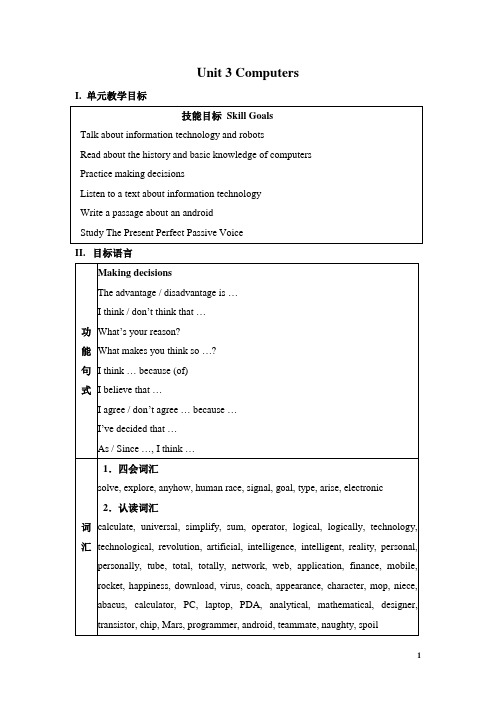
Unit 3 Computers I. 单元教学目标II. 目标语言III. 教材分析与教材重组1. 教材分析本单元以computers为话题,旨在通过单元教学,综合听、说、读、写等多种形式,使学生了解计算机和信息技术的产生和发展过程及其在我们的学习、工作、娱乐等生活中所起的重要作用,激发学生对信息技术的兴趣。
1.1 Warming up提供几幅与计算机有关的图片,形象地说明了计算机的发展历程,并用三个问题引发学生对这一话题的思考,从而起到热身的作用。
1.2 Pre-reading根据文章内容预设问题,检查学生对computers相关知识及应用的了解。
学生对computers的了解可能参差不齐,这更能激发学生想获取更多知识的欲望,从而引出下面的阅读文章——WHO AM I?。
1.3 Reading中以别致的标题WHO AM I?引起学生的好奇心,使学生迫不急待地阅读这篇文章,并判断出“I”是computer,从而对文章的内容印象更深刻。
文章以第一人称的形式按时间先后顺序讲述了computers的产生、发展和现状,并用拟人化的口吻表达了computers乐于为人类服务的精神。
1.4 Comprehending 1 通过scanning的方式完成反映计算机发展历程的时间进程;2 通过填表的形式帮助学生宏观梳理文章结构,找出每个段落的主题句(论点)及具体的支持性论据;3 是读后讨论,要求学生结合自己的生活实际讨论计算机如何改变了我们的生活。
1.5 Learning about language分词汇(Discovering useful words and expressions)和语法(Discovering useful structures)两大部分。
Discovering useful words and expressions 1 根据单词释义写出相对应的词汇,考查学生对WHO AM I? 文章中的重要词汇及短语的理解。
Unit 3 Computers 知识点学案 高三英语一轮复习人教版必修二
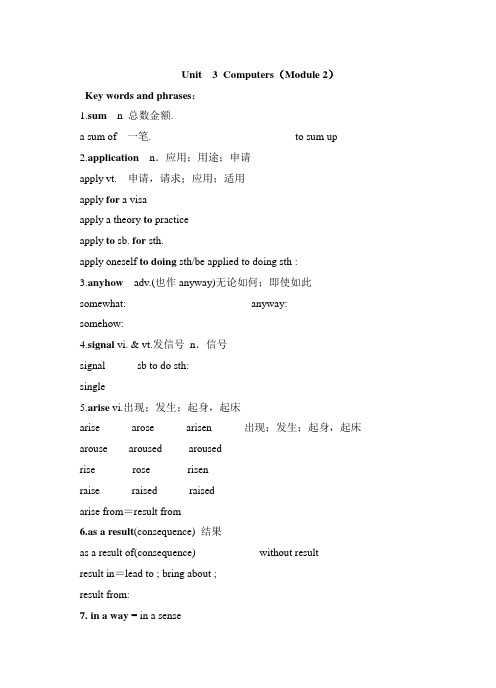
Unit 3 Computers(Module 2)Key words and phrases:1.sum n 总数金额.a sum of 一笔. to sum up_____________2.application n.应用;用途;申请apply vt.申请,请求;应用;适用apply for a visa________________apply a theory to practice __________________apply to sb. for sth.__________________apply oneself to doing sth/be applied to doing sth :______________________ 3.anyhow adv.(也作anyway)无论如何;即使如此somewhat: __________________ anyway: _______________________ somehow: _____________________4.signal vi. & vt.发信号n.信号signal _____ sb to do sth: ___________________single__________________5.arise vi.出现;发生;起身,起床arise arose arisen 出现;发生;起身,起床arouse aroused aroused ______________________rise rose risen _______________________raise raised raised _______________________arise from=result from __________________6.as a result(consequence) 结果as a result of(consequence)________ without result _________________ result in=lead to ; bring about ; _________result from: ______________________7. in a way = in a sense________________ a/some degree/to an/some extent 到某种程度上in the way__________ in no way_________ all the way___________ by the way___________ on one's way/the way to: _____________make way for________________ make one’s way to do_____________ 8.deal with处理;安排;对付;论述;谈论deal with sb. _____________ deal with sth.________________ 如何处理……:_______ to deal with sb./sth._______ to do with.9.watch over看守;监视;守护;照管watch out (for)______________ keep (a) watch ____ :_____________ on/off watch_______________ watch one's step___________________ mon adj. .共同的,常见的have sth in common with sb = be_____ common ______ sb in sth: ________ common ground________________ common sense___________________ 11.share v. 分享;分担; 共同具有share sth _______ sbn.一份东西;一份责任;股份12.provide vt. & vi. 提供provide sth._____ sb=provide sb ______sthprovided / providing conj. ___________________13.make up: 组成;凑足;编造;化妆;打扮make up for__________________ make for __________________ be made up of /consist of__________ make a fool of ______________ make fun of ________ make out___________________ make the most/ the best of ____________ make it____________________ make a contribution/contributions to__________pare…with: _______________________compare…to: ______________________15.simplify: _________________modify________ qualify________ beautify_______ clarify_________Key sentences:1. Huge sums have been invested in this project.译:___________________________2. 用arise, arouse, rise, raise填空①New difficulties will ________ from such situation.②His strange behaviour ________ our suspicions.③The price of wheat has ________/has been ________ since the last summer.3. ①You could also repeat the name in a way that does not sound forced or artificial.译:____________________________________________________________ ②Her social life got ____________________________ her studies.她的社交活动妨碍了她的学习。
人教版高中英语必修2Unit 3Computers语言要点教案 新
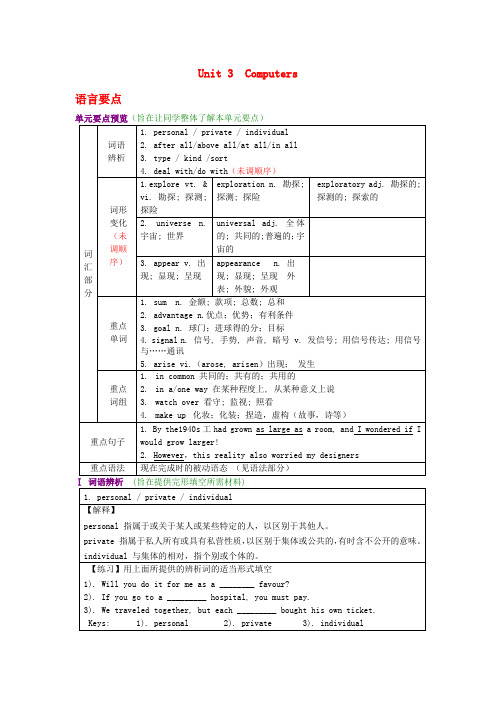
Unit 3 Computers 语言要点Ⅱ 词性变化(旨在提供语法填空所需材料)1. sum n. 金额; 款项; 总数; 总和[典例]1). He was fined the sum of 200. 他被处以200英镑罚金。
2). The sum of 5 and 3 is 8. 5加3的和是8。
[重点用法]in sum简言之; 总而言之sum sb/sth up形成对某人[某事物]的看法[练习] 中译英1). 总之, 计划告吹了。
_______________________________________________________________________________ ______2). 我认为她是个很能干的经理。
_______________________________________________________________________________ ______Keys: 1). In sum, the plan failed.2). I summed her up as a competent manager.2. advantage n.优点;优势;有利条件[典例]1). He has the advantage of a steady job. 他有工作稳定的有利条件。
2). They took full advantage of the hotel's facilities. 他们充分利用旅馆的设备。
[重点用法]take advantage of 对……加以利用;欺骗to sb.’s advantage 对某人有利have /get/win an advantage over (of)胜过;优于[练习] 中译英1).协议对我们有利。
_______________________________________________________________________________ ______2).她利用了我的慷慨。
人教版高中英语必修2unit3课文知识点详解
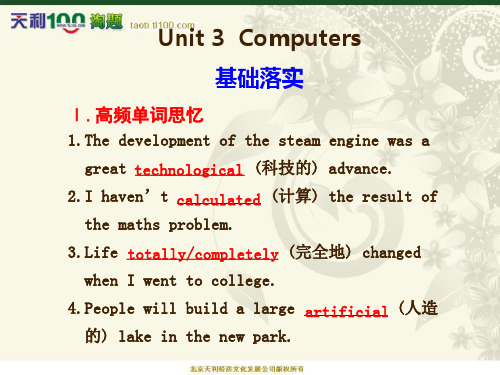
即学即用 (1)—Excuse me,could you tell me the way to
the British Museum? —Sorry,I’m a stranger here. —A. A.Thanks anyway B.It doesn’t matter C.Never mind D.No problem 解析 A.不管怎样,还是要谢谢你。B.没关系。 C.不要紧;不用担心。D.没问题。句意为: ——打扰了,你能告诉我去大英博物馆的路 吗?——抱歉,我在这儿是个陌生人。——不 管怎样,还是要谢谢你。
(3)mark含义广泛,指事物留下的深刻印记,比 sign更侧重于区别性或指示性的标志。 (4)symbol指被人们选出的物体或图案,用来代 表 另一事物,作为该事物的标记或象征。 The dove is the symbol of peace. 鸽子是和平的象征。
即学即用
(1)The soldiers are hiding in the trees and
raised aised raising
即学即用 (1)我本来想事情会很容易,但是出现了许多问题。
I thought it would be easy,but a lot of problems have arisen . (2)事故由粗心大意引起。 Accidents arise from carelessness.
是我的一切。
with the help of my electronic
brain which neverwhfiocrhgentesvearnyftohrignegt是s 状语,
说an明yt主hi谓ng部分的伴随状况。在这个with短语中,
包含一个定语从句
人教新课标高中英语必修二Unit 3 Computers教案
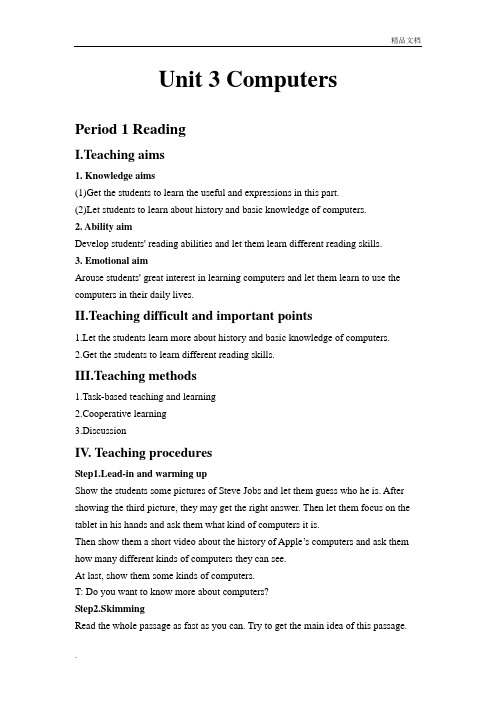
Unit 3 ComputersPeriod 1 ReadingI.Teaching aims1. Knowledge aims(1)Get the students to learn the useful and expressions in this part.(2)Let students to learn about history and basic knowledge of computers.2. Ability aimDevelop students' reading abilities and let them learn different reading skills.3. Emotional aimArouse students' great interest in learning computers and let them learn to use the computers in their daily lives.II.Teaching difficult and important points1.Let the students learn more about history and basic knowledge of computers.2.Get the students to learn different reading skills.III.Teaching methods1.Task-based teaching and learning2.Cooperative learning3.DiscussionIV. Teaching proceduresStep1.Lead-in and warming upShow the students some pictures of Steve Jobs and let them guess who he is. After showing the third picture, they may get the right answer. Then let them focus on the tablet in his hands and ask them what kind of computers it is.Then show them a short video about the history of Apple’s computers and ask them how many different kinds of computers they can see.At last, show them some kinds of computers.T: Do you want to know more about computers?Step2.SkimmingRead the whole passage as fast as you can.Try to get the main idea of this passage.A. The computer wants to find “who he is”.B. The function (功能) of the computer.C. The computer becomes popular around the world.D. The history and the applications of the computer.Find out the topic sentence of each paragraph and underline them.Step3. Careful-reading Para 1ScanningLet the students read this paragraph carefully and try to finish the following char.T: How could these changes become possible?Step4. Careful-reading Para 2Let the students read paragraph 2 quickly and find the answer to this question. After check the answer, give them one minute to find the five different ways of memory for computers in different periods of time.Step5. Careful-reading Para 3Since the memory of computers has been improved greatly, will them become more powerful and can be used in more fields?Now read the last paragraph and find out the new applications of computers.Step6. Further Reading1.The passage is written by_______ order?2. What is the most used rhetoric (修辞法) in this passage?A. simile(明喻)B. personification (拟人)C. metaphor (暗喻)3. In what ways have computer been changed?Ask some students to summarize. If they have any difficulty, give them some hints. Step7. Activity: Be the next Jobs!We have learned the history of computers and seen the great development of computers. What will the computers be like in the future? Do you want to design your computers as Jobs did? Now try to design your computers.For example:This is the new computer designed by our company.It is very small and transparent(透明的). You can even put it into your pocket. (Shape/color)It has a free-internet in it. You can… (Applications/functions)It only costs you … (Price)Give the students five minutes to prepare and invite some of them to show their ideas. Step8. Homework1. Try to retell the history of computers.2. Read the passage carefully and underline the difficult sentences.。
2022届一轮复习人教版高中英语教材透析:必修二 Unit 3 Computers 学案
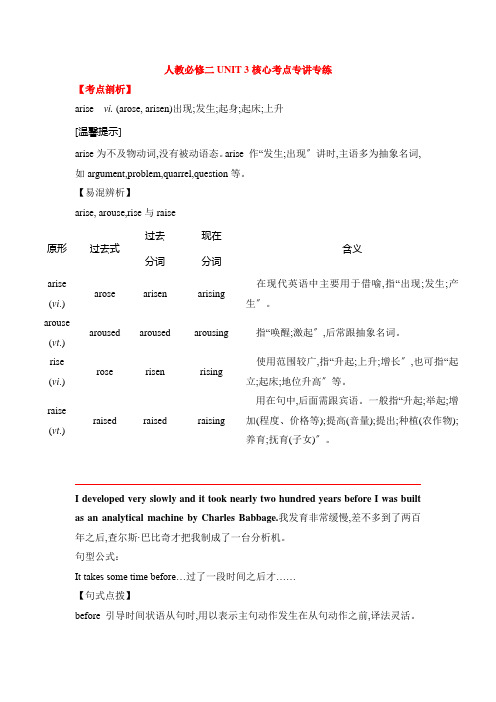
人教必修二UNIT 3核心考点专讲专练【考点剖析】arise vi. (arose, arisen)出现;发生;起身;起床;上升[温馨提示]arise为不及物动词,没有被动语态。
arise 作“发生;出现〞讲时,主语多为抽象名词,如argument,problem,quarrel,question等。
【易混辨析】arise, arouse,rise与raise原形过去式过去分词现在分词含义arise (vi.) arose arisen arising在现代英语中主要用于借喻,指“出现;发生;产生〞。
arouse(vt.)aroused aroused arousing 指“唤醒;激起〞,后常跟抽象名词。
rise (vi.) rose risen rising使用范围较广,指“升起;上升;增长〞,也可指“起立;起床;地位升高〞等。
raise (vt.)raised raised raising用在句中,后面需跟宾语。
一般指“升起;举起;增加(程度、价格等);提高(音量);提出;种植(农作物);养育;抚育(子女)〞。
I developed very slowly and it took nearly two hundred years before I was builtas an analytical machine by Charles Babbage.我发育非常缓慢,差不多到了两百年之后,查尔斯·巴比奇才把我制成了一台分析机。
句型公式:It tak es some time before…过了一段时间之后才……【句式点拨】before 引导时间状语从句时,用以表示主句动作发生在从句动作之前,译法灵活。
(1)强调主句动作发生在从句之前,意为“不等……就……〞。
(2)在“It+be+时间段+before从句〞中,意为“……之后才……〞。
(3)在“It+be+否认形式+long+before从句〞中,意为“……不久就……〞。
高中英语Unit3Computers教案新人教版必修2

Unit 3 Computers类别 话题词汇词组、 短语功能语法随堂练习教学目的和要求〔〕Information technologyhistory and basic knowledge of computers robotscalculate calculator PC notebook common analytical simple simple-minded technology technological revolution universal mathematical artificial intelligence anyway totally network truly race birth IT advantage disadvantage type disagree choice material personally create coach move arise brain mop wanderin common in one ’s opin ion go by so ... that ... deal with humanrace in a way make up with the help of after all watch over1. 做出决定〔 Making decisions〕I think that ... In my opinion ... I believe that ...Let ’ s make our decision.I ’ ve decided that ...2. 推理〔 Reasoning 〕The advantage/disadvantage is ...What ’s your reason? Why do you think so?I think this one is better because ...I don ’t like this one because ...现在完成时的被动语态结构和用法I have been made smaller and smaller.I have been used by millions of people.I have truly been built to help the human race.1、 Go over the story and discuss with your partner who the speaker is in thisstory.Now write down three sentences from the story to support your idea. It is a computer because it describes :Itselfas the analyticalmachine designed by CharlesBabbage 〔 which was the firstdesign of a computer 〕. Then in 1822 I was builtas an AnalyticalMachine by CharlesBabbage.Alan Turing as its real father 〔 and he designed thefirstreal computer 〕 . “ Myreal father was Alan Turing ...〞Having artificial intelligence〔 which only computers have 〕 . People have naturalintelligence.“ However, people thoughtI was simple-mindeduntilthey discoveredI had ‘artificial intelligence’ . 〞课程标准要求掌握的工程 ;Teaching aims and demands2、 Look at the timeline below.Fillin the blanks with information from the reading above.Timeline1642: The computer began as a calculating machine.1822: The Analytical Machine was made by Charles Babbage.1936: Alan Turing wrote a book to describe how computers could be made.1960s:Computers had new transistors and became smaller.1960s:The first family of computers was connected to each other.1970s:Computers were brought into people’ s homes.Now: Computers connect people all over the world together.课堂笔记1、 I know this sounds very simple,but at that time it was a technological revolution.我知道这听起来很简单,但是在那个时候这却是一项技术革命。
英语知识点[必修 2]Unit 3《Computers 》教案2(1)-总结
![英语知识点[必修 2]Unit 3《Computers 》教案2(1)-总结](https://img.taocdn.com/s3/m/0a8432e20242a8956bece4c0.png)
Unit3 Computers Book2Period 1 Words and expressionsLiu JuanI .Content :New words and expressions in Unit 3II .Teaching aims:Master the new words and expressions.III.Main points:1.Pronounce the words and phrases correctly2.Try to remember the spelling and Chinese meaningIV .Difficult pointsUse the words freelyV .Teaching stepsSTEP1. Pronunciation correctingRead after the teacher or the tape twice. Then the teacher asks the students to read words by themselves.STEP2. Skills in memorizing the new wordsThe teacher analyses the structure and usage of the new words briefly.STEP3. Consolidation of the words and expressions★单词翻译1.____________ vt.计算2. ____________ n.计算器3. ____________n.笔记本4. ____________a.简单的5. ____________n.工艺;技术6. ____________a.科技的7. ____________n.革命8. ____________a.宇宙的9. ____________a.数学的10. ____________a.人造的11. ____________n.智力;智能12. ____________ad.完全地13. ____________n.网络14. ____________ad.真实地15. ____________n.种族16. ____________n.诞生17. ____________n.优势;优点18. ____________n.缺点19. ____________v.打字20. ____________vi.不同意21. ____________n.选择22. ____________n.原料23. ____________ad.亲自地24. ____________vt.创造25. ____________n.教练26. ____________n.步骤;动作27. ____________vi.出现28. ____________n.脑29. ____________n.拖把30. ____________vi.徘徊★词组1.___________________共有;共用2. ___________________依……看来3. ___________________走过;过去4. ___________________处理;安排;对付5. ___________________在某种程度上6. ___________________弥补;整理7. ___________________毕竟8. ___________________在……的帮助下9. ___________________看守;监视★单词拼写1. Credit cards have brought about a ________(革命) in people’s spending habits2. I’m sorry to say that I ______ (彻底地)forget about it.3. Look before leap. Don’t be ____________(头脑简单的).4. With the development of _________(技术), more practical machines have been invented.5. In basketball matches, American players have an obvious_________(优势) in height.6. P________ speaking, I’m in favor of the plan.7. In c______ with many others, she applied for a training place.8. I don’t like a________ flowers, which cannot purify(净化)the air.9. A n_______ computer is easy to carry.1o.He’s very clever. He’s got quite high i____________ quality.★选词填空1.2.Don't take it seriously. The story is only ________.3.I couldn't get through the gate because your car was ________.4.The change was an improvement ___________.5.I'll buy a house which modern, comfortable and _____ in a quiet place.6.The old man is ______ in health.7.Peter works well.______ he likes to help others.8.His brother __________ in the army for two years.9.You shouldn't have talked about the boy's ___________ affairs.10.Do you mind waiting a few more minutes for the photos? They ______.ing words and expressions (Ss book P20)STEP5. Homework1. Learn all the words and expressions by heart.2. Preview the text and finish discovering useful words and expressions.Blackboard Design:Period 2 TextLiu JuanI .ContentText: Who am I?II .Teaching aims:1. understanding the general meaning of the new text to train the reading ability of the students2. 德育目标:了解计算机的发展历程。
新人教高中Unit3Computers3.2学案必修2英语解析

These changes only became possible as my memory improved.
Since the 1970s many new applications have been found for me.
1.
Supporting details
1.calculating machine 1.
2.analytical machine 2.
3.universal machine 3.
4.PC
4.
ptop
5.
2. 3. 4. 5. 6. 7.
8.
Step 4.Post-reading Have a debate: Computers have good effects on our life. You may begin by... 1.Great changes have taken place since computers came into people’s life... 2.Over time... 3.By using computers,we deal with... 4.We can’t live without... 5.I don’t agree... 6.We still...with the help of...
As time went by,I was made smaller.First as a PC.
高中英语学案大全,高考学案大全 Then as a laptop.
As a result my memory became so large that even I couldn’t believe it! I am a computer!
人教版课标必修二 Unit 3 Computers 学案
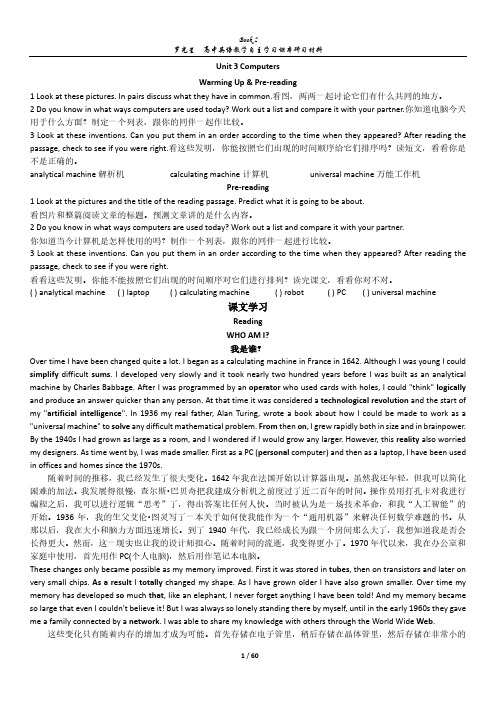
Unit 3 ComputersWarming Up & Pre-reading1 Look at these pictures. In pairs discuss what they have in common.看图,两两一起讨论它们有什么共同的地方。
2 Do you know in what ways computers are used today? Work out a list and compare it with your partner.你知道电脑今天用于什么方面?制定一个列表,跟你的同伴一起作比较。
3 Look at these inventions. Can you put them in an order according to the time when they appeared? After reading the passage, check to see if you were right.看这些发明,你能按照它们出现的时间顺序给它们排序吗?读短文,看看你是不是正确的。
analytical machine解析机calculating machine计算机universal machine万能工作机Pre-reading1 Look at the pictures and the title of the reading passage. Predict what it is going to be about.看图片和整篇阅读文章的标题。
预测文章讲的是什么内容。
2 Do you know in what ways computers are used today? Work out a list and compare it with your partner.你知道当今计算机是怎样使用的吗?制作一个列表,跟你的同伴一起进行比较。
3 Look at these inventions. Can you put them in an order according to the time when they appeared? After reading the passage, check to see if you were right.看看这些发明。
人教版高中英语必修二Unit 3《Computers》(Reading)学案
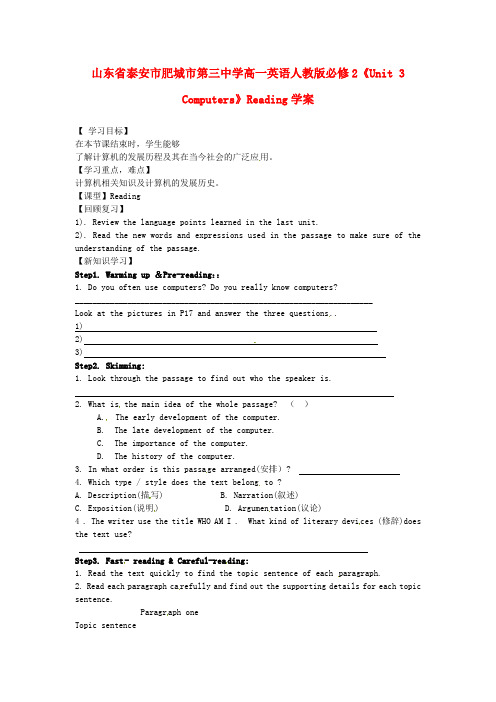
山东省泰安市肥城市第三中学高一英语人教版必修2《Unit 3Computers》Reading学案【学习目标】在本节课结束时,学生能够了解计算机的发展历程及其在当今社会的广泛应用。
【学习重点,难点】计算机相关知识及计算机的发展历史。
【课型】Reading【回顾复习】1). Review the language points learned in the last unit.2). Read the new words and expressions used in the passage to make sure of the understanding of the passage.【新知识学习】Step1. Warming up &Pre-reading::1. Do you often use computers? Do you really know computers?____________________________________________________________________Look at the pictures in P17 and answer the three questions..1)2)3)Step2. Skimming:1. Look through the passage to find out who the speaker is.2. What is the main idea of the whole passage? ()A. The early development of the computer.B. The late development of the computer.C. The importance of the computer.D. The history of the computer.3. In what order is this passa ge arranged(安排)?4. Which type / style does the text belong to ?A. Description(描写)B. Narration(叙述)C. Exposition(说明)D. Argumen tation(议论)4 . The writer use the title WHO AM I . What kind of literary devi ces (修辞)does the text use?Step3. Fast- reading & Careful-rea ding:1. Read the text quickly to find the topic sentence of each paragraph.2. Read each paragraph ca refully and find out the supporting details for each topic sentence.Paragr aph oneTopic sentenceSupportingdetails 1.calculating machine(1642 in France)2.3.4.PC5. .Paragraph twoTopic sentenceSupportingdetails tubes 2.3. workParagraph threeTopic sentenceSupportingdetails 1. communications 2.3. 4. robots5. 6.7. space rockets3.Read the text again and do the True or false exercises:1.Alan Turing built an Analytical Machine to solve any mathematical problems. ( )2.People began to realize that the computer got cleverer and quicker with ti me passing. ( )3.The computer began to serve th e human race since it was brought into people’s homes. ( )4.Since the 1970s, the computer was used by people around the world through the Internet. ( )5. The larger the computer is, the more memory it has. ( )【当堂达标】SummaryI was born as a ___________ machine in 1642. When I was young, I was good at____________ difficult sums.About 2 hundred years had passed before I could think _________ and produce_______ answers. At that time, I was called an ___________ machine. In 1936, I was built as a ___________ machine . I had the ability to _______any mathematical problem. From then on, I grew rapidly both in _______ and memory. Later I stored my memory on __________instead of in _____. I became _______ in size but _________in intelligence.As time went by, I became even smaller, for I put my memory on a very small ______, which made me become PC and laptop.In the 1960s, I could be connected with other computers by a ___________. From then on, I was able to share my knowle dge with others through the _____ _____ ______. After that, I had many new______________. Now, I am glad to serve human beings asa ________ _________ and a pleasant ___________.【反思提升】 Discussion:1)How do you usually use computers in your daily life?________________________________________________________________________________________________________________________________________2)Work with your partners to list some advantages and disadvantages of the internet.Step4 【Homework】Read though the text, pay more attention on new language points.Finish the exercises on the newspaper about the text.Step 2. 1. It’s a computer 2. D. 3. time 4.C 5. PersonificationStep 3 Over time , I have been changed quite a lotAnalytical machine ; laptopThese changes only become possible as my memory improved .Transistors ;small chipsSince the 1970s many new applications have been found for meFinance trade mobile phones medical operationsF T F T FCalculating simplifying logically quicker analytical universalSolve size transistors tubes smaller higher chip network WorldWideWeb applicati ons devoted friend helperd 学习指导单词读熟并能默写结合所学过的知识作答!结合课文思考选择准确答案仔细阅读课文完成填空英语要说出来你一定能行!。
【人教版】高中英语必修二:Unit 3 Computers 教案
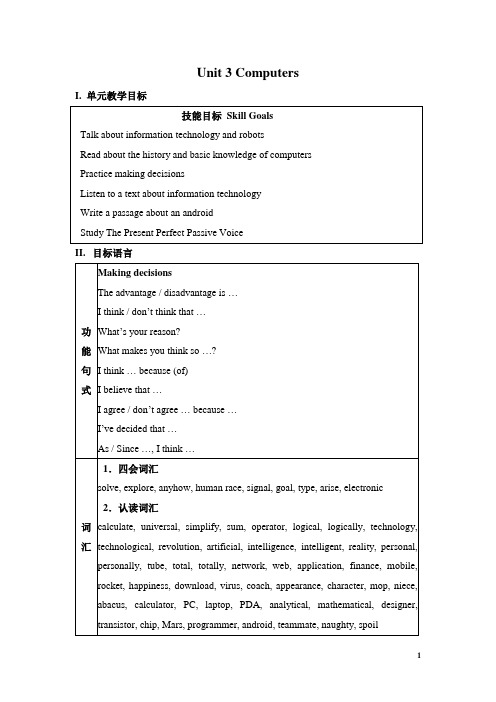
Unit 3 Computers I. 单元教学目标II. 目标语言III. 教材分析与教材重组1. 教材分析本单元以computers为话题,旨在通过单元教学,综合听、说、读、写等多种形式,使学生了解计算机和信息技术的产生和发展过程及其在我们的学习、工作、娱乐等生活中所起的重要作用,激发学生对信息技术的兴趣。
1.1 Warming up提供几幅与计算机有关的图片,形象地说明了计算机的发展历程,并用三个问题引发学生对这一话题的思考,从而起到热身的作用。
1.2 Pre-reading根据文章内容预设问题,检查学生对computers相关知识及应用的了解。
学生对computers的了解可能参差不齐,这更能激发学生想获取更多知识的欲望,从而引出下面的阅读文章——WHO AM I?。
1.3 Reading中以别致的标题WHO AM I?引起学生的好奇心,使学生迫不急待地阅读这篇文章,并判断出“I”是computer,从而对文章的内容印象更深刻。
文章以第一人称的形式按时间先后顺序讲述了computers的产生、发展和现状,并用拟人化的口吻表达了computers乐于为人类服务的精神。
1.4 Comprehending 1 通过scanning的方式完成反映计算机发展历程的时间进程;2 通过填表的形式帮助学生宏观梳理文章结构,找出每个段落的主题句(论点)及具体的支持性论据;3 是读后讨论,要求学生结合自己的生活实际讨论计算机如何改变了我们的生活。
1.5 Learning about language分词汇(Discovering useful words and expressions)和语法(Discovering useful structures)两大部分。
Discovering useful words and expressions 1 根据单词释义写出相对应的词汇,考查学生对WHO AM I? 文章中的重要词汇及短语的理解。
人教版高中英语必修2《Unit 3 Computers》教案2篇
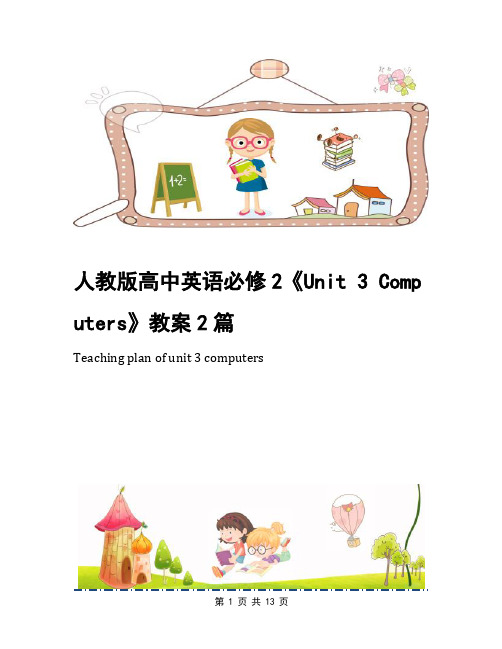
人教版高中英语必修2《Unit 3 Comp uters》教案2篇Teaching plan of unit 3 computers人教版高中英语必修2《Unit 3 Computers》教案2篇前言:英语作为在许多国际组织或者会议上都是必需语言,几乎所有学校选择英语作为其主要或唯一的外语必修课。
英语教学涉及多种专业理论知识,包括语言学、第二语言习得、词汇学、句法学、文体学、语料库理论、认知心理学等内容。
本教案根据英语课程标准的要求和教学对象的特点,将教学诸要素有序安排,确定合适的教学方案的设想和计划、并以启迪发展学生智力为根本目的。
便于学习和使用,本文档下载后内容可按需编辑修改及打印。
本文简要目录如下:【下载该文档后使用Word打开,按住键盘Ctrl键且鼠标单击目录内容即可跳转到对应篇章】1、篇章1:人教版高中英语必修2《Unit 3 Computers》教案2、篇章2:人教版高中英语必修2《Unit 3 Computers》教案篇章1:人教版高中英语必修2《Unit 3 Computers》教案教学准备教学目标1.To practise listening comprehension.2.To practise making decisions and reasoning教学重难点1.To practise listening comprehension.2.To practise making decisions and reasoning教学工具课件教学过程Step1.revision1.check the homework exercises.1). It has been reported that children will be offered free education.It has been reported that free education will be offered to children.2). It has been said that we will be offered the latest computer science course book.It has been planned that the latest computer science course book will be offered to us.3). I have been told by Peter that I will be lent his notebook computer for a week.I have been told by Peter that his notebook computer will be lent to me for a week.2.Question: What can computers be used as?Step2.Lead-inAs we know, science and technology is developing very fast and computers have become smaller and smaller. They have been used in many fields. So, the 21st century is the century of information technology What does it mean? Does information technology/ IT only mean things like computers? Of cause not. Actually, it means more than computers. Computers are just one kind of IT. What else do you know is part of IT?(TV, radio, CD-ROM, DVD, books……)Step3.Listening (SB)1.Pre-listening: What are the changes brought by different forms of IT ?What are the advantages and disadvantages ofthem ?2.While-listening:Go through the chart and make sure the students look at the chart before they listen to the tape. (This is to sharpen their attention and listen for the answers. This will also help them get the gist of the text.) Then Listen to the tape and finish filling in the chart. (If necessary, play the tape for several times.)Say: After listening to their talk, we know all kinds of IT have both disadvantages andadvantages.Let’s check the answers together.Type of IT Advantages DisadvantagesTV You can both listen and watch. You cannotwrite to friends.Web You can find information. It is very expensive.Radio You can listen to English. You cannot watch a film.Book You can get information. Sometimes it is out of date.3.Post-listening:1)(pair work): decide which type of IT is best for you to use right now. Make your choice and give your reasons by using the following expressions.I think that….In my opinion, ….I believe that….I agree because….I dis agree because….I’ve decided that….2)(group work): Discussion :Computers are useful and have brought us lots of good things, but they also cause bad effects. What attitude should we have towards the computer? (Make good use of it but never get trapped by it.)Step4.Speaking1.Pre-speakingSay: From what we have learn, we should admitthat computers and the web have a great influence on the school education as well as people’s life. It has come into people’s everyday life and many families hold computers in their homes. Now there is a task for you.2.While-speaking1) Situation: You have been asked by your parents to help choose computers for your home. You and your friend have looked at several computers. Talk about the special things each computer can do. Make a decision about which kind of computer to buy and explain why.Information input: Show students some pictures of different computers (desktop computer 特点______________4.科技;工艺 _______________5.目标,目的 n. ______________6.出现;发生vi. ______________7.解决;解答vt. _______________8.类型,打字 v.信号._________10.无论如何,即使如此adv. ______二.写出下列单词的变化形式1.operator n. 操作员; 接线员→_____________v. 操作; 经营→____________n. 操作; 经营2.technology n.工艺; 科技; 技术→_______________ adj. 科技的3.intelligence n.智力; 聪明; 智能→_________adj.智能的; 聪明的4.appearance n. 外观; 外貌; 出现→________________vi. 出现5.application n. 应用; 用途; 申请→_______________v. 应用; 申请→___________n. 申请人; 求职者6.explore vt. 探测→___________n. 探险家; 勘探者→_____________ n. 探索7.personal adj. 私人的; 个人的;→________adv. 就个人而言; 亲自→_________n. 个性; 人格;三、用所给词的适当形式填空(1)Can you say dolphins are much more ____________than other animals?Well, they are animals of high _____________. (intelligent)(2) She expressed her _________ opinion yesterday. ____________ speaking, I agreed with what she said. (personal)(3) Any ___________ who would like to_____________ to become anassistant in our company should send us an___________ .(apply)四、语境助记——词不离句,句不离段With the electronic technology revolution going on,simplified calculation is solved in the application on finance by universal exploration. Our goal of making life happier is certain to be realized through man's intelligence.五、翻译下列必背短语?1.在某种程度上_______________2.依…看;据…认为_____________3.从…时候起 _______________4.结果 _______________5.处理;安排;对付 ____________6.弥补,补足;整理,编造_________7.毕竟_______________?8.看守,监视 _______________9.在……帮助下_______________?六.根据句子意思写出单词的正确形式。
2021-2022学年人教版高中英语:必修二 Unit 3 Computers重要知识点讲解 学案

Unit 3Computers重要知识点讲解1. In pairs discuss what they have in common. 两人一组讨论一下他们有哪些共同之处。
in common 共同的We have very much/a lot /nothing /little /something in common.我们有很多/没有/几乎没有/有一些相似之处。
You know, Mary, you and I have one thing in common.玛丽,你知道,我俩有一个共同点。
2. Can you put them in an order according to the time when they appared?你能按照他们现世的时间顺序把他们排列成序么?in order按照顺序; 挨次整齐; 整洁恰当, 正确; 符合程序out of order次序紊乱(机器等)失灵; 出故障有病;违反议事规那么3. as a calculating machine 作为一台计算机器calculate on: depend on 指望We are calculating on fine weather for the sports meeting.我们指望着运动会有好天气。
4. be crazy about…非常喜爱,醉心于She's crazy about dancing. 她热衷于跳舞。
5. do research into … 进行…的研究6. come true 实现,到达7. consist of 由……组成〔be made up of〕His job consists of helping old people who live alone. 他的工作包括帮助无人照顾的独居老人。
The beauty of the plan consists in its simplicity. 这个方案妙就妙在简明扼要。
- 1、下载文档前请自行甄别文档内容的完整性,平台不提供额外的编辑、内容补充、找答案等附加服务。
- 2、"仅部分预览"的文档,不可在线预览部分如存在完整性等问题,可反馈申请退款(可完整预览的文档不适用该条件!)。
- 3、如文档侵犯您的权益,请联系客服反馈,我们会尽快为您处理(人工客服工作时间:9:00-18:30)。
Computers-知识点复习学案核心单词1. commonadj. 共同的,普遍的;常见的常用结构:in common 共有,公用(在句中多作状语)have nothing/little/a lot/something in common (with) sb.与某人没有/许多/有些共同之处in common with 和……一样common sense/knowledge 常识common welfare 公共福利易混辨析common/ordinary/usual/normalcommon 指“共有的,公共的;共同的;常见的”。
反义词为rare。
common作“普通的”讲时可与ordinary换用。
如“普通人”也可以说成common people。
ordinary 意为“普通的,平淡无奇的”,指没有什么特别的地方。
usual 意为“平常的,通常的,一向的”,含惯例之意。
normal 意为“正常的”。
Jane and I have nothing in common.=I have nothing in common with Jane.我与简毫无共同之处。
The problems are common to all societies.这些问题是所有社会的通病。
In common with many young people, he prefers pop songs.和许多年轻人一样,他喜欢流行歌曲。
He is in ordinary clothes. 他穿着平常的衣服。
We meet every day at the usual place.我们每天在往常那个地方见面。
高手过招单项填空Harry visited the bookstore every week. He became such a customer that the bookseller gave him some books as presents. (2009·12·浙江桐庐检测)monB. normalC. usualD. average解析:选C。
由“Harry visited the bookstore every week”可知,他是常客,含有“习惯,惯例”之意,故选C。
2. signaln. 信号;手势;声音;暗号v. 发信号;用信号传达;用信号与……通讯A red light is usually a signal for/of danger.红灯通常是危险的信号。
He signaled (to) the waiter to bring the menu.他示意服务员把菜单拿过来。
常用结构:signal to sb./sth. for sth.用信号传达(某信息);用信号与(某人)通讯signal with ...用……发信号高手过招翻译句子①铁路的红信号灯亮了,所以火车停下了。
②他用红旗传达信号。
答案:①The railway signal was on red, so the train stopped.②He was signalling with a red flag.3. sumn. 金额; 款项; 总数; 算术题常用结构:in sum 简言之; 总而言之sum up/sum sth. Up 总结;概括He was fined the sum of 200$. 他被处以200美元的罚金。
The sum of 5 and 3 is 8. 5加3的和是8。
To sum up, there are three main ways of solving the problem.概括起来说,这个问题主要有三种解决办法。
翻译句子高手过招(原创)总之, 计划失败了。
答案:In sum, the plan failed.4. arisevi. (arose, arisen)出现,发生;起床,起身A new difficulty has arisen.出现了新的困难。
Accident arise from carelessness.疏忽大意往往会引起事故的发生。
He arose at dawn.他黎明即起。
常用结构:arise from/out of 由……引起;由……产生高手过招翻译句子①夜间起风暴了。
②由于缺乏交流而产生了问题。
答案:①A storm arose during the night.②Problems have arisen out of the lack of communication.adv.(也作anyway)不管怎样,无论如何;反正;即使如此联想拓展somehow adv. 以某种方式, 用某种方法;不知怎么地somewhat adv.有点,稍微He told me not to buy it, but I bought it anyhow.他告诉我不要买它,但不管怎样,我还是买了。
It may snow, but anyhow I will go to the town.可能要下雪,但无论如何我都要进城。
We must get the work finished somehow by tomorrow morning.我们必须设法在明天早上以前把工作做完。
Somehow we lost our way.不知怎么地我们迷路了。
My jacket is somewhat like yours.我的夹克与你那件有点相似。
高手过招(1)单项填空—You don’t seem to be quite yourself today. What’s wrong?—Oh, I’m suffering from a cold. Nothing serious, . (2009·12·安徽舒城检测)A. yetB. indeedC. anyhowD. though(2)完成句子(原创)①我对这个工作有点厌倦了。
I am tired of this work.②不知怎么地,他害怕她。
he was afraid of her.③他无论如何也不能使她信服。
He couldn’t convince her .解析:(1) 选D。
此处表达“转折”,意思是“然而”。
(2)①somewhat ②Somehow ③anyhow6. personallyadv. 就个人而言;亲自联想拓展personally意为“就个人而言”时的同义短语:in my opinionas far as I’m concernedin my viewfor my partas far as I can seefrom my point of viewfor my perspectiveThe owner of the hotel welcomed us personally.这家旅馆的主人亲自接待了我们。
Personally (speaking), I think he is a very good man, but you may not agree.就个人而言, 我认为他是个很好的人, 但也许你不这么认为。
完成句子(原创)①She said she didn’t like Tom, but (就个人而言), I thought he was an honest boy, though sometimes careless.②(幸好), the planes appear to be quite safe.③(自然地),their ideas are important to everyone in the country.④(高兴的是) for him, his stepmother was kind to him.⑤(出人意料的), he failed the exam.答案:①personally ②Luckily/Fortunately③Naturally ④Happily ⑤Surprisingly7. goaln. 球门;(进球)得分;目标;目的常用结构:score/kick a goal 踢进一球;得一分keep goal 守球门life goal/one’s goal in life 生活目标achieve/realize one’s goal 实现目标He headed the ball into an open goal. 他乘虚把球顶入球门We won by three goals to one.我们以三比一获胜。
You’d better set a goal before you start.开始前,你最好设定一个目标。
高手过招翻译句子(原创)①他已经实现了他的目标。
②我的人生目标是帮助他人。
答案:①He has achieved his goal.②My goal in life is to help others.重点短语8. in a way在某种程度上(表示对情况的态度)联想拓展in a way=in one way=in some waysin the way 挡道;造成阻碍in one way 在某方面in some ways 在某些方面in no way 决不,无论如何都不(位于句首时构成倒装)on one s way to 在去……的路上by the way顺便说一下in any way在任何方面in every way在各方面give way (to sb./sth.)屈服;让步lose one s way 迷路(there is) no way 不可能;没门by way of 经过;经由in the way和in one’s way两个短语含义相同,都含“挡住去路;碍事”之意。
In a way, it’s kind of nice to be studying alone.在某种程度上讲,独自一个人学习相当不错。
高手过招单项填空I can’t see the word on the blackboard. Your head is . (原创)A. on the wayB. in a wayC. by the wayD. in the way解析:选D。
in the way和in one’s way均表示“挡住去路;碍事”之意。
故D项符合句意。
9. go by经过;(时间)过去;依照,靠……判断联想拓展go against 违背;对……不利go without 勉强维持,凑合;没有……而将就go in for 爱好;参加;从事go over 复习;仔细审查go ahead 进行;发生;(尤指经某人允许)开始做go through 通过;经历,经受;查看,调查go out 出去;熄灭go off 离开,出发;爆发,突然响起;停止;熄灭go up 上升go down 下降He went by his teacher without even a greeting.他从老师身边经过时连声招呼也没打。
